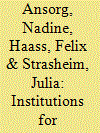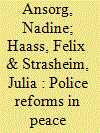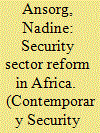| Srl | Item |
| 1 |
ID:
117939


|
|
|
|
|
| Publication |
2013.
|
| Summary/Abstract |
IN DIVIDED SOCIETIES, CHARACTERIZED BY AN ANTAGONISTIC SEGMENTATION
among identity groups, formal state institutions are of paramount importance in regulating intergroup conflict. Institutional reform is thus an
appealing option to shape such state institutions-the system of government, electoral systems and party regulations, territorial state structure, the
judiciary, and the security sector-in order to promote sustainable peace
and prevent the occurrence or recurrence of violent conflict. However,
research is far from having arrived at a consensus about what institutions
work where and how. Is the choice of institutional design in a postwar situation determined at all by expected political utility? What distinguishable
effects can different designs have under what conditions? How do institutions interact-what role does the "concert of institutions" play in the
impact on sustainable peace?
|
|
|
|
|
|
|
|
|
|
|
|
|
|
|
|
| 2 |
ID:
146929


|
|
|
|
|
| Summary/Abstract |
This article presents new data on provisions for police reform in peace agreements (PRPA) between 1975 and 2011. The PRPA dataset complements past research on the determinants and effects of specific terms in agreements with detailed data on police reform provisions. The PRPA dataset also adds a quantitative dimension to the thus far largely qualitative literature on post-conflict security sector reform (SSR). It includes information on six subtypes of police reform: capacity, training, human rights standards, accountability, force composition and international training and monitoring. We show that there is currently a high global demand for the regulation of police reform through peace agreements: police reform provisions are now more regularly included in agreements than settlement terms that call for power-sharing or elections. We observe interesting variations in the inclusion of police reform provisions in relation to past human rights violations, regime type, or the scope of international peacekeeping prior to negotiations, and illustrate the implications of police reform provisions for the duration of post-conflict peace. Finally, we stimulate ideas on how scholars and policymakers can use the PRPA dataset in future to study new questions on post-conflict police reform.
|
|
|
|
|
|
|
|
|
|
|
|
|
|
|
|
| 3 |
ID:
152384


|
|
|
|
|
| Summary/Abstract |
Many African states have security sector reform (SSR) programs. These are often internationally funded. But how do such programs account for previously existing security institutions and the security needs of local communities? This article examines SSR all over Africa to assess local ownership and path dependency from a New Institutionalist perspective. It finds that SSR, particularly in post-conflict countries, tends to be driven by ideas and perceptions of international donors promoting generalized blueprints. Often, such programs only account in a very limited way for path-dependent aspects of security institutions or the local context. Hence, the reforms often lack local participation and are thus not accepted by the local community eventually.
|
|
|
|
|
|
|
|
|
|
|
|
|
|
|
|